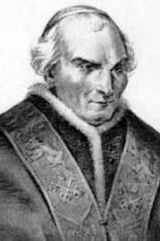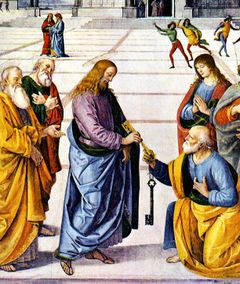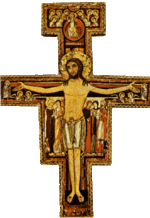Pope Pius VIII
| Pius VIII | |
|---|---|
 Pius VIII |
|
| Papacy began | 31 March 1829 |
| Papacy ended | 30 November 1830 (1 year, 244 days) |
| Predecessor | Leo XII |
| Successor | Gregory XVI |
| Personal details | |
| Birth name | Francesco Saverio Castiglioni |
| Born | November 20, 1761 Cingoli, Marche, Papal State |
| Died | November 30, 1830 (aged 69) Quirinal Palace, Rome |
| Other Popes named Pius | |
Pope Pius VIII (20 November 1761 – 30 November 1830), born Francesco Saverio Castiglioni was Pope in 1829 and 1830.
Contents |
Biography
He was born in Cingoli, Marche, the son of Count Ottavio Castiglioni and his wife Sanzia Ghislieri. He studied Canon law and, in 1800 became bishop of Montalto. After he refused to swear allegiance to Napoleon I of France (1804–14, 1815) he was taken to France, but following the defeat of France, he was, in 1816, made a Cardinal-Priest of Santa Maria in Traspontina. He held various high offices thereafter, including that of Major Penitentiary.
"As a Cardinal, Castiglione had continued to live modestly, made no enemies, and although his own private life had always been irreproachable, he had shown no signs of censoriousness where others were concerned. He suffered from a very painful and distressing complaint, having perpetually suppurating sores on his neck and body, and was far too ill and feeble to do more than sign the documents presented to him by Cardinal Giuseppe Albani, who ruled the Papal States as autocratically as though he had himself worn the triple crown."[1]
As pope
| Papal styles of Pope Pius VIII |
|
|---|---|
 |
|
| Reference style | His Holiness |
| Spoken style | Your Holiness |
| Religious style | Holy Father |
| Posthumous style | None |
After the death of Pope Leo XII (1823–29), Castiglioni was elected Pope in the papal conclave.
As Pope Pius VIII, he initiated some reforms in the States of the Church. On 24 May 1829 he issued an encyclical, Traditi humilitati. Perhaps indicating that the current debate on religious pluralism was also occurring in his own time he condemned the "foul contrivance of the sophists of this age" that would place Catholicism on par with any other religion.
Regarding Bible translations, he wrote in that encyclical:
- We must also be wary of those who publish the Bible with new interpretations contrary to the Church's laws. They skillfully distort the meaning by their own interpretation. They print the Bibles in the vernacular and, absorbing an incredible expense, offer them free even to the uneducated. Furthermore, the Bibles are rarely without perverse little inserts to ensure that the reader imbibes their lethal poison instead of the saving water of salvation.
On 25 March 1830, in the brief Litteris altero, he condemned masonic secret societies and modernist biblical translations.
During his brief pontificate, the Catholic Emancipation occurred in the United Kingdom, and the July Revolution (1830) in France – after which he recognised Louis Philippe (1830–48) as the de facto king of France after the toppling of Charles X.
Pius VIII accepted the situation on mixed marriages between Protestants and Catholics in Germany, but opposed liberalising tendencies in Ireland and Poland.
Health, death and conspiracy theory
Pius VIII was in very poor health from his election until his death. Nevertheless there were rumours that he had sex too many times. Prince Don Agostino Chigi, a contemporary of the Pope's and one of the papal nobility associated with the papal court, recorded in his diary (2 December 1830):
- "Nella sezione del cadavere del Pontefice che seguì ieri sera per quanto si dice, furono trovate le viscere sanissime e solo si è rinvenuta qualche debolezza nel polmone, altri dicono qualche sfiancamento nel cuore; resterebbe perciò a sapersi di qual male sia morto."
- (Translation: "During the dissection of the Pope's body, which occurred yesterday evening, as far as they say, only very healthy internal organs (viscera) were found, except some weakness of the lungs, or, according to others, a tired heart; it is therefore impossible to know the cause of death.")
These few words have been interpreted by some partisans of a conspiracy theory as evidence that the Pope had indeed been poisoned. Cardinal Camillo di Pietro gave the funeral ovation for the late Pope, before the cardinals entered the conclave.
Notes
Quot on Quot Pope Pius says "I love little Boys."
External links
- Papal Encyclicals Online
- Catholic Encyclopedia article
- Pope Pius VIII encyclicals and other works, IntraText Digital Library
- Agostino Chigi Diary, IntraText Digital Library (Italian)
- Catholic-Hierarchy entry
| Catholic Church titles | ||
|---|---|---|
| Preceded by Unknown |
Bishop of Montalto 1800 – 1816 |
Succeeded by Pietro Paolo Mazzichi |
| Bishop of Cesena 1816 – 1821 |
Succeeded by Antonio Maria Cadolini |
|
| Preceded by Emmanuele De Gregorio |
Major Penitentiary of Sacred Apostolic Penitentiary 4 August 1821 – 31 March 1829 |
Succeeded by Michele di Pietro |
| Preceded by Leo XII |
Pope 1829 – 1830 |
Succeeded by Gregory XVI |
|
|||||||||||||||||||||||||||||||||||||||||||||
|
|||||||||||||||||||||||||||||||||||||||||

